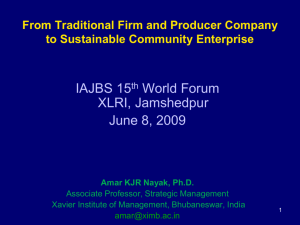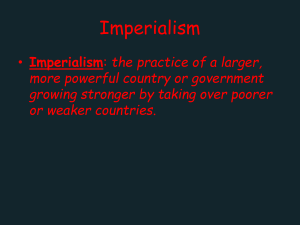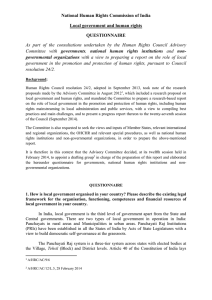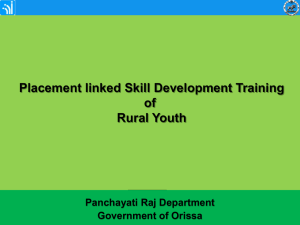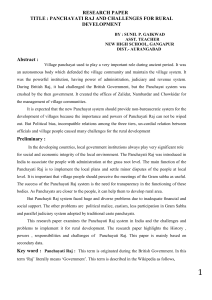Local Governance & Social Accountability: Article Reviews
advertisement
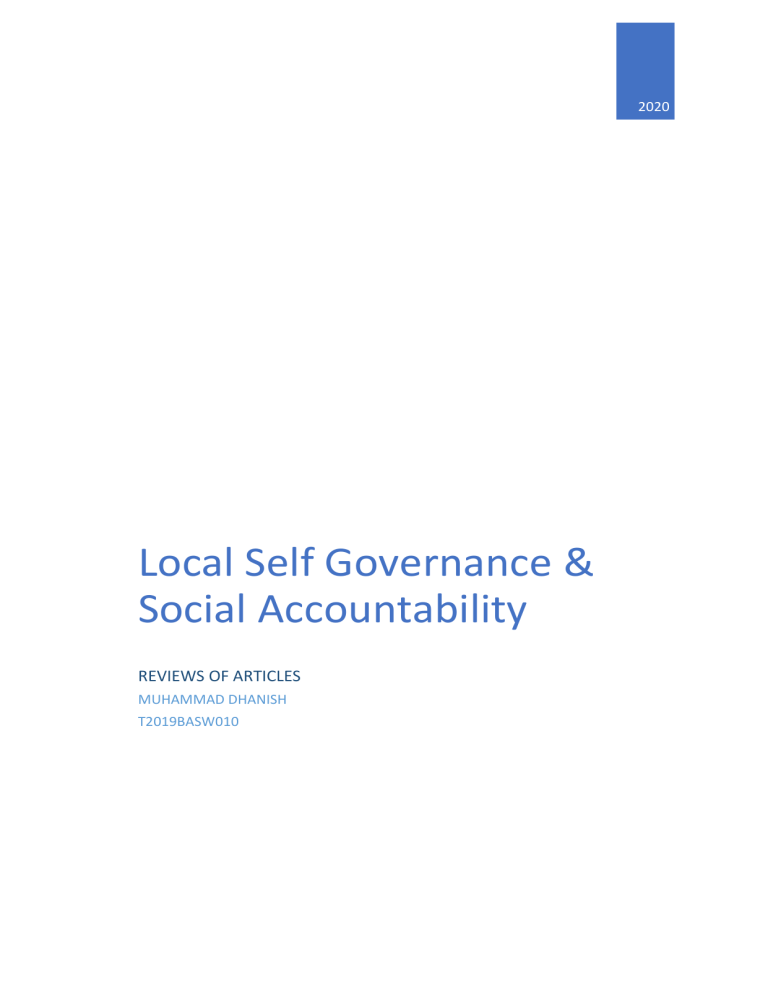
2020 Local Self Governance & Social Accountability REVIEWS OF ARTICLES MUHAMMAD DHANISH T2019BASW010 Fundamental Rights and Fundamental Duties: Rights and duties play an important part in the development of a nation or the growth of an organization. Rights on the one hand give an individual an opportunity to be a part of development process while duties on the other hand make an individual obliged to play a part in the development. There are certain fundamental rights to make sure all gets the chance to the part of our society. These Fundamental Rights are considered as basic human rights of all citizens, irrespective of their gender, caste, religion or creed etc. There are six fundamental rights in India. They are Right to Equality, Right to Freedom, Right against Exploitation, Right to Freedom of religion, Cultural and Educational Rights, and Right to Constitutional Remedies. 1. Right to Equality Right to Equality ensures equal rights for all the citizens. The Right to Equality prohibits inequality on the basis of caste, religion, place of birth, race, or gender. 2. Right to Freedom Right to freedom provides us freedom of speech, freedom of expression, freedom of assembly without arms, freedom of movement throughout the territory of our country, freedom of association, freedom to practice any profession, freedom to reside in any part of the country. 3. Right against Exploitation Right against Exploitation stops human trafficking, child labour, forced labour and also prohibits any act of compelling a person to work without wages. 4. Right to Freedom of Religion Right to Freedom of Religion guarantees religious freedom the States should treat all religions equally and impartially and that no state has an official religion. All people have the freedom of conscience and the right to preach, practice and propagate any religion of their choice. 5. Cultural and Educational Rights Cultural and Educational Rights protects the rights of cultural, religious and linguistic minorities. Educational rights ensure education for everyone irrespective of their caste, gender, religion, etc. 6. Right to Constitutional Remedies Right to Constitutional Remedies ensures citizens to go to the supreme court of India to ask for enforcement or protection against violation of their fundamental rights. The Supreme Court has the jurisdiction to enforce the Fundamental Rights even against private bodies, and in case of any violation, award compensation as well to the affected individual. The aforementioned are some of the key takeaways from the broad Article which digs deeper into the philosophy, circumstances and the aim behind the Fundamental Rights and Fundamental Duties that are mentioned in our Constitution. Panchayati Raj- G Mathew: The note on Panchayati Raj by G Mathew is a comprehensive and wide perspective information regarding different aspects of Panchayati Raj, including its history, evolution, roles and impact. The Panchayati Raj’s is an ample example of Local Self Governance through which maximum utilisation and effectiveness of resources as well as manpower is achieved through the process of Decentralisation. The decentralised type of administrative system in India date back to an era that’s very old and which can be notes as one which assimilates into the Indian culture. These were mainly managed and rules through kinships or, in the Indian context, Caste. It too constituted a headman who takes the decision and several other advisers or council which helps in the decision-making process. The preTerritorial period of Panchayati system was even described as which surpassed its administrative efficiency more than the modern Panchayati Raj system. Adding to this is the detailed notes of administrative, legal, community, organisational activities of Panchayati Raj carried during different periods of Medieval history. Panchayati Raj have effectively been a force towards bringing a decentralised institution that, with the reservation of woman and other socially backward communities, have been a torch bearer towards social justice and equity. Thus, the casteist structure of these institutions have been at least attempted to be changed. Moreover, with community organisation and other root level programs, the proper localised implementation of the policies has been made and reviewed. These institutions play a major role in assisting the state and central machinery to manage various local issues while at the same time have ensured that the concerns of people on the bottom of the society reaches the centralised power structure. Connecting to the present scenario, Panchayati Raj and other local government institutions have been the key tool in combating the Covid pandemic. They were able to provide medical and social assistance to those affected while providing the state and its machinery information and data’s regarding the local developments. Thus overall, the article emphasizes how the Panchayati Raj institutions made a pivotal contribution towards reaching out to the roots of population ensuring social, educational and economic justice. It defines the well-built ideology that have played the major part to thrust these institutions. While many discrepancies exist within the system, the pioneering mode of governance will be a statutory institution to the generations coming ahead. Directive Principles of State Policy: Directive Principles of State Policy provide essential guide-lines both for the state as well as the citizens for establishing economic democracy in India. The Constitution makers in India did not force on the people any particular economic system but they only tried to suggest a system which could be most suited to Indian conditions. With the passing of Forty-Second Constitution Amendment Act, ii has been provided that India shall be a socialist democracy but socialism is not in the traditional sense but in the sense, which suits Indian conditions. The Sapru Committee had recommended a division of fundamental rights into two classes — judiciable and nonjudiciable.The Constitution Act of India, 1935, itself provided for ‘Instruments of Instructions’ which were a fruitful idea. Ambedkar said. The above statement of Dr. Ambedkar makes it crystal clear that these principles are not binding upon the Government. The Government is to strive. If it does not fulfil these principles despite its striving, nobody can challenge it in the court or law. Liberal Intellectualistic, this category includes those things on which the liberal intellectuals have been insisting for the last many years) The State shall endeavour to secure for the citizens a uniform civil code throughout the territory of India. Though Basu’s fears are genuine, yet we must not efface from our mind a naked reality that the President’s or Governor’s powers to veto a Bill passed by the Legislature is only limited. In the words of Dr. Ambedkar“. The Directive Principles cannot be pressed into service either by the President or the State Governor for the purposes of vetoing a law passed by the legislature”. in a parliamentary form of government, the constitutional rulers cannot be assertive. If they are, they cannot be tolerated.



